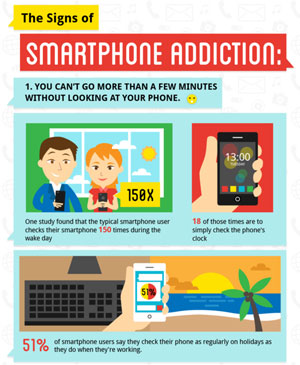 How many times have you heard a friend or acquaintance joke about their teen being addicted to a Smartphone? (See my “you may addicted to your smartphone if…” infographic HERE.)
How many times have you heard a friend or acquaintance joke about their teen being addicted to a Smartphone? (See my “you may addicted to your smartphone if…” infographic HERE.)
Unfortunately, many of us hear these comments almost on a daily basis. It’s ironic that something so mundane, such as checking on Social Media or a game app, can quickly become a problem if it starts to interfere with a child’s daily activities and ability to function. The stark reality is that people can become addicted to their Smartphones.
Unfortunately, addiction is not the only problem associated with Smartphones. Many communities are being rocked by cyberbullying and a lot of teens are learning hard life lessons when it comes to a lack of Social Media etiquette. Parents are starting to wake up to the fact that our teen’s beloved gadget can cause a few serious side effects.
This raises the powerful question for parents, “How can I teach my teen responsible Smartphone skills?”
Understanding Teenage Behaviors
To understand why teens are susceptible to addictions, sexting, and cyberbullying you need to delve into the teenage psyche.
An adolescent brain is still forming and will not fully mature until a person reaches the age of 25. Our children’s developing prefrontal cortex is more susceptible to the quick paced world Smartphones offer. Teenagers tend to make poor judgment calls, take more risks, or can be lured into a behavioral addiction with their devices.
Thankfully, parents are able to help mold and guide a teen’s Smartphone skills.
Teaching Responsible Smartphone Skills
Over 1.8 billion people own Smartphones. According to one study, they computed that an average owner will check their screen 150 times a day. Considering those numbers, it shouldn’t come as a surprise when 44% of people admit feeling anxious when they can’t access their phone. This gives us a good understanding of why cyberbullying, sexting, and addictions are on the rise.
Educators and researchers have been studying data and have developed some suggestions to help modern families avoid Smartphone pitfalls. It appears that moderation is key. Setting limits for your teen will help curb a majority of the negative side effects technology can harbor.
Listed below are a few techniques to help parents foster responsible Smartphone skills in a teen:
- Set aside time once a day that they can just use their Smartphone. Browse Social Media, message friends, or snap a few photos. Limiting interactions to this special hour allows addicts to reclaim the rest of her day for other activities.
- Create “no phone zones”. Designate certain areas of the house (bedrooms, bathrooms, and the dinner table) off limits to technology and phones.
- Avoid using phones before going to sleep or storing your phone by the bed. The light interrupts the natural rhythms of sleep and ringtones can interfere with a good night’s rest.
- Honor family dinners. Make it a priority to eat together as a family.
- Review Social Media etiquette. Friend your child, follow their accounts, and monitor your child’s online activity to keep tabs on their posts and texts.
- Create a Smartphone contract outlining expectations and consequences. Smartphones are a privilege and they can be taken away.
- Instruct your teen to post only what they would want their Grandmother to view. The Internet doesn’t forget and even disappearing messages can come back to haunt them. Scholarships and jobs could be at stake if they don’t keep a pristine online reputation.
Regaining Control
In this day and age, it is hard not to rely on technology– especially when you have a busy teen in the house.
Think about all the conveniences you are able to access at the tap of a screen or whisper into the speaker. Smartphones simplify lives and allow parents to easily connect with their children. However, constant or inappropriate interactions can lead to serious issues and override all the benefits Smartphones have to offer.
By dialing back on Smartphone use, our children can reclaim valuable freedom and personal interactions.
Amy Williams
Amy Williams is a freelance journalist based in Southern California and mother of two. As a parent, she enjoys spreading the word on positive parenting techniques in the digital age and raising awareness on issues like cyberbullying and online safety.



